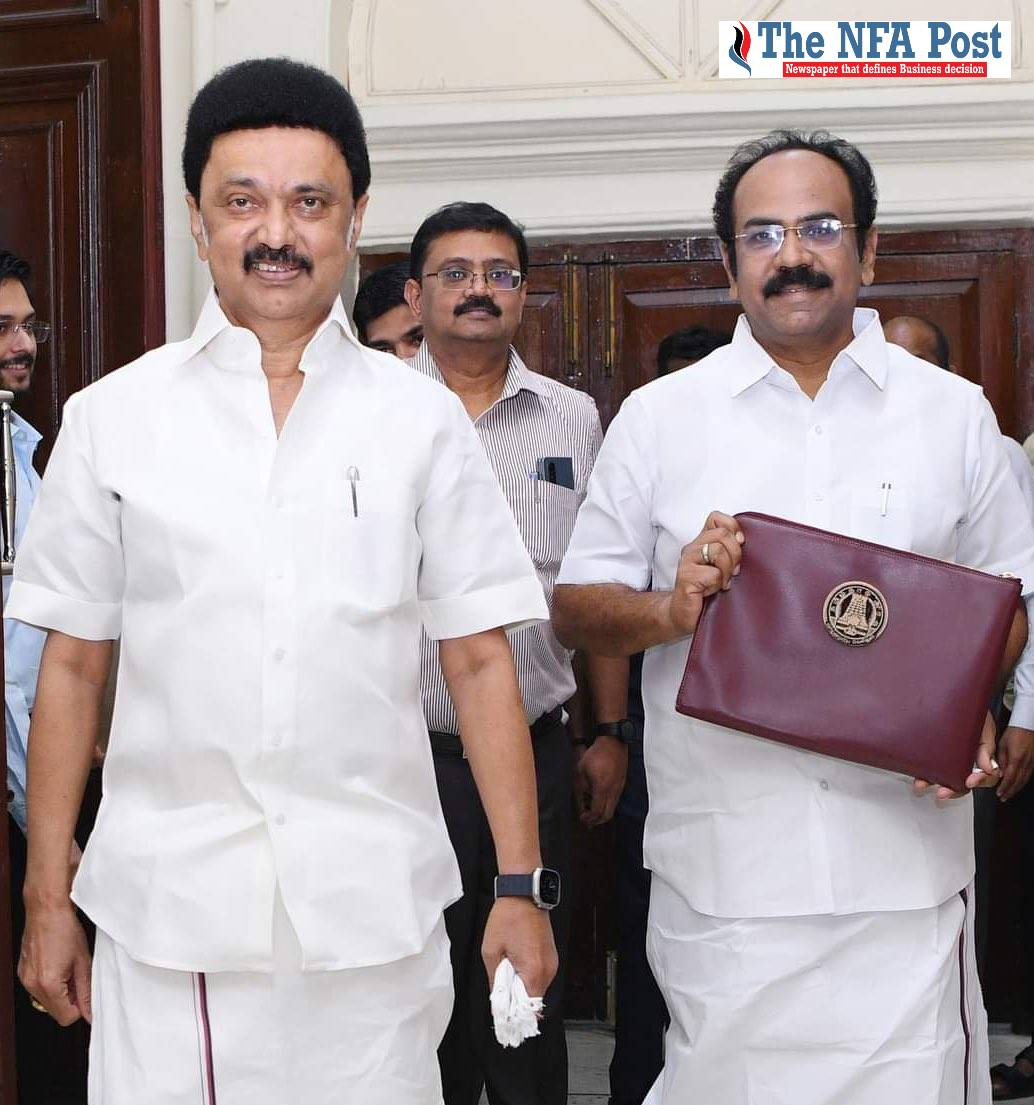Chennai, NFAPost: With an eye on achieving a $1-trillion economy by 2030, the Tamil Nadu government on Monday contained the fiscal deficit at Rs 1,08,690 crore in the Budget Estimates 2024-25, pegging at 3.44% of the gross state domestic product (GSDP) while reducing it from the previous years.
The state government has been following the glide path of fiscal consolidation and has reduced it from 3.46% in 2022-23 to 3.45% in 2023-24 to 3.44% in 2024-25.
The total revenue receipts of the state government, including the central transfers, are estimated to be Rs 2,99,009.98 crore in Budget Estimates 2024-25 as against the Revised Estimates of Rs 2,72,576.80 crore in 2023-24.
The estimates for 2025-26 is pegged at Rs 3,41,851.96 crore and Rs 3,94,972.15 crore in 2026-27 which indicates a growth of 14.33% and 15.54%, respectively.
Taking into account the Tamil Nadu’s economic growth, revision of taxes and improvement in collection efficiency, the state’s own tax revenue has been estimated at Rs 1,95,173 crore in the Budget Estimates 2024-25, which is a growth of 14.71% over the revised estimates of 2023-24. In the Budget Estimates 2024-25, the total revenue expenditure is estimated at Rs 3,48,289 crore.
Presenting the Budget, Tamil Nadu Finance Minister Thangam Thenarasu said that the revenue deficit in the Budget Estimates for 2024-25 is estimated at Rs 49,278.73 crore.
“In view of the revenue augmentation measures including improvement in collection efficiencies and rate rationalisation, the revenue deficit is expected to reduce to Rs 18,098.03 crore in 2025-26 and subsequently lead to a surplus of Rs 5,966.67 crore in 2026-27. This will create additional space for capital expenditure in the state,” said Tamil Nadu Finance Minister Thangam Thenarasu.
The Budget announced a host of new schemes for almost all sections of the society based on the seven focal points – Social Justice, Welfare of the marginalized, Transforming young Tamils as global achievers, Knowledge based economy, Equality focused on welfare of women, Sustainable Green Future and Tamil Language and Culture.
Pushing ahead with its flagship welfare initiatives, the government proposes to create a ‘Hut-Free Tamil Nadu’ by 2030 and announced that eight lakh concrete houses will be constructed in rural areas. In the first phase, one lakh new houses will be built at a unit cost of Rs 3.50 lakh per house in the coming year.
The selected beneficiaries will be provided with house sites in case they are landless and will be provided with funds for constructing the house directly into their bank accounts. With a scientific survey and transparent selection process, a new scheme, ‘Kalaignarin Kanavu Illam’, will be implemented in the coming year at a cost of Rs.3,500 crore, providing an opportunity for the poor to build their dream homes.
Chennai will host a global startup summit in January 2025, bringing together leading startups and accomplished young entrepreneurs from across the world. The government will establish a Tamil Nadu Artificial Intelligence Mission to develop guidelines for constructively leveraging AI in education, employment, industry, research and medicine, and to establish clear protocols for its utilization. This mission will involve professors from leading educational institutions in Tamil Nadu, executives from the electronics industry, and experts in the field.
The government will devise plans to generate an additional 100 billion units of renewable green energy and transform Tamil Nadu as the leading state in the country by 2030. A new green energy company has been established as the first step in this journey towards a sustainable future. The institution will implement green hydrogen and pumped storage hydroelectric power generation projects along with solar energy, wind energy and other new green initiatives.
The state government has allocated an amount of Rs 12,000 crore for Chennai Metro Rail Phase-II in the Budget Estimates 2024-25. Chennai Metro rail, which is the preferred choice of 3 lakh daily commuters, is being expanded in its second phase to cover 3 routes covering a distance of 119 km. This project is being implemented expeditiously at a cost of Rs.63,246 crore. The first elevated stretch from Poonamalle to Kodambakkam will be commissioned in December 2025.
The government has decided to create a statutory body to implement iconic world-class road infrastructure projects in Tamil Nadu, incorporating best management practices across the world. In this regard, a bill to establish ‘Tamil Nadu State Highways Authority’ will be introduced in the current session. This move aims to facilitate significant investments in road infrastructure development through public-private partnership. In the Budget Estimates, a sum of Rs.20,043 crore has been allocated to the Highways and Minor Ports Department.
The government plans to encourage the establishment of Global Capability Centers (GCCs) by offering a payroll subsidy of 30% in the initial year, 20% in the second year, and 10% in the third year for roles with salaries exceeding Rs 1,00,000 per month.
In new industrial units having over 500 women, differently abled or transgender employees, the state government will provide a 10% payroll subsidy for two years.
A sum of Rs 13,720 crore would be allocated for the Tamil Nadu government’s flagship scheme Kalaignar Magalir Urimai Thittam under which around 1.5 crore women are provided an assistance of Rs 1000 per month.





